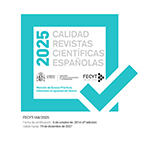La promoción estatal de la acuicultura sustentable: controversias sobre el desarrollo en el centro-sur de Chile
Resumen
En América Latina, emergen controversias en territorios rurales sobre proyectos de desarrollo que a menudo se transforman en conflictos, debido a sus efectos ecológicos, materiales, económicos, sociales y culturales. Para reconstruir las controversias acerca de la promoción estatal de la acuicultura sustentable, se describen los marcos interpretativos que se ponen en juego entre los actores regionales. Este estudio se basó en un análisis sociológico del discurso de tipo hermenéutico de las respuestas orales a las preguntas abiertas originadas en la aplicación de un cuestionario estructurado, mediante entrevistas individuales cara a cara, a 27 informantes clave de las regiones del Biobío y de Ñuble en el centro-sur de Chile en el año 2018. En estos territorios rurales del centro-sur de Chile, la controversia sobre la acuicultura es más social que ambiental. Se relaciona con dos marcos o modalidades de interpretación de la acuicultura sustentable y que se enraízan y legitiman por los actores territoriales; un marco enfatiza la acuicultura como una promesa de bienestar a través de nuevas actividades; otro significa la acuicultura en cuanto una actividad económico-política que no solo es cuestionable por su falta de generación de valor socioeconómico en el territorio, sino que involucra las decisiones de los modos de vida futuros. Una historia extractivista, combinada con la ambigüedad del Estado, parece limitar las opciones imaginadas al menos en sus marcos de interpretación; en territorios rurales con un pasado reciente de extractivismo, la promoción estatal de acuicultura seguirá siendo controversial si no se logra generar valor local.
Descargas
Descarga artículo
Licencia
La revista Política y Sociedad, para fomentar el intercambio global del conocimiento, facilita el acceso sin restricciones a sus contenidos desde el momento de su publicación en la presente edición electrónica, y por eso es una revista de acceso abierto. Los originales publicados en esta revista son propiedad de la Universidad Complutense de Madrid y es obligatorio citar su procedencia en cualquier reproducción total o parcial. Todos los contenidos se distribuyen bajo una licencia de uso y distribución Creative Commons Reconocimiento 4.0 (CC BY 4.0). Esta circunstancia ha de hacerse constar expresamente de esta forma cuando sea necesario. Puede consultar la versión informativa y el texto legal de la licencia.












